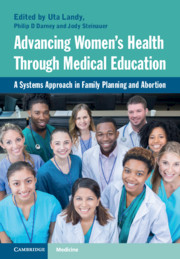 Advancing Women's Health Through Medical Education
Advancing Women's Health Through Medical Education Implications for Training
from Section III - Family Planning Curricular Design & Implementation
Published online by Cambridge University Press: 30 July 2021
Abortion stigma is a phenomenon in many regions and cultures. Those receiving training in clinical abortion care should understand abortion stigma both as a theoretical concept and as a lived experience for the abortion-care workforce. Indeed, one of the most challenging aspects of abortion care is managing and negotiating the stigma that often comes with it.In this chapter we define abortion stigma, and discuss its impact on people who seek abortion and on those who care for them.We introduce key concepts in stigma dynamics, in particular the ways in which stigma and silence create vicious cycles that affect psychosocial well-being, abortion complications, and law and policy.We consider the ways in which training settings bring unique stigma-related challenges for both trainer and trainee, including learner dilemmas about seeking abortion training, disclosing abortion training, and interacting with other healthcare providers who may be opposed to abortion.We conclude by reviewing strategies for managing stigma and developing resilience to its consequences, including values clarification trainings and the Provider's Share Workshop.
To save this book to your Kindle, first ensure no-reply@cambridge.org is added to your Approved Personal Document E-mail List under your Personal Document Settings on the Manage Your Content and Devices page of your Amazon account. Then enter the ‘name’ part of your Kindle email address below. Find out more about saving to your Kindle.
Note you can select to save to either the @free.kindle.com or @kindle.com variations. ‘@free.kindle.com’ emails are free but can only be saved to your device when it is connected to wi-fi. ‘@kindle.com’ emails can be delivered even when you are not connected to wi-fi, but note that service fees apply.
Find out more about the Kindle Personal Document Service.
To save content items to your account, please confirm that you agree to abide by our usage policies. If this is the first time you use this feature, you will be asked to authorise Cambridge Core to connect with your account. Find out more about saving content to Dropbox.
To save content items to your account, please confirm that you agree to abide by our usage policies. If this is the first time you use this feature, you will be asked to authorise Cambridge Core to connect with your account. Find out more about saving content to Google Drive.